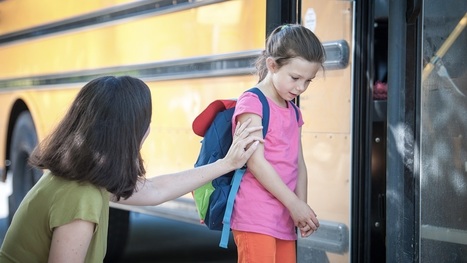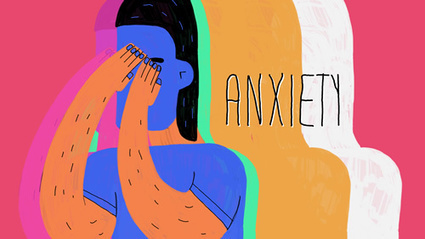 Your new post is loading...
 Your new post is loading...

|
Scooped by
John Evans
|
Crisis Text Line, which provides free, text messaging-based counseling services for the U.S., U.K. and Canada, has seen 49 times the number of mentions of “virus,” “COVID-19” or “coronavirus” as of mid-March than in February. The nonprofit usually sees more than 3,000 conversations a day, but in recent weeks that number has been as high as 6,000, according to spokeswoman Ashley Womble.
On March 13, coronavirus was mentioned in 15 percent of all conversations between students and the group’s volunteer counselors, according to the New York-based nonprofit. More than half of people texting about those concerns are in the 18- to 34-year old range. School cancellations and closures contribute to a large part of the anxiety they have shared.

|
Scooped by
John Evans
|
The first time Jessica Calise can remember her 9-year-old son Joseph's anxiety spiking was about a year ago, when he had to perform at a school concert. He said his stomach hurt and he might throw up. "We spent the whole performance in the bathroom," she recalls.
After that, Joseph struggled whenever he had to do something alone, like showering or sleeping in his bedroom. He would beg his parents to sit outside the bathroom door or let him sleep in their bed. "It's heartbreaking to see your child so upset and feel like he's going to throw up because he's nervous about something that, in my mind, is no big deal," Jessica says.
Jessica decided to enroll in an experimental program, one that was very different from other therapy for childhood anxiety that she knew about. It wasn't Joseph who would be seeing a therapist every week — it would be her.
The program was part of a Yale University study that treated children's anxiety by teaching their parents new ways of responding to it.
"The parent's own responses are a core and integral part of childhood anxiety," says Eli Lebowitz, a psychologist at the Yale School of Medicine who developed the training.

|
Scooped by
John Evans
|
In the last decade, rates of anxiety-related disorders in teenagers have steadily risen, particularly in girls. Researchers and psychologists posit several hypotheses about why these rates are on the rise -- from digital hyperconnectivity to heightened external pressures to simply a greater awareness, and therefore diagnosis, of mental health concerns.
Whatever the causes, Dr. Lisa Damour has hopeful news for parents and teens: first, some degree of stress and anxiety is not only normal but essential for human growth. And if those levels become untenable, there are tested strategies for reining anxiety back in.
"Starting school can be exciting for young kids. It can also be scary. That’s true whether this is their first time going to school or they’re starting a new grade. And the change in routine can be especially tough for kids with learning and attention issues. How can you help your young child feel less anxious about going to school? Here, four experts weigh in on why young kids may feel anxious about school, and how to help."
Via Tom D'Amico (@TDOttawa)

|
Scooped by
John Evans
|
Anxiety is increasingly becoming a serious issue for American teens. Sixty-two percent of incoming freshman surveyed by the American College Health Association said they’d experienced overwhelming anxiety the year before, up from 50-percent in 2011. High school counselors and parents are increasingly aware of the problem, especially when teens are so anxious they don’t want to go to school.

|
Scooped by
John Evans
|
A lot has been written about maths anxiety in children. I have a Year 7 student who always complains that he 'can't do it' before he's even tried. It's clear to me where his anxiety stems from - unlike his peers, he doesn't know his times tables well, which makes many simple tasks (long multiplication, simplifying fractions etc) really difficult for him.
But this post isn't about maths anxiety in students. It's about maths anxiety in maths teachers. Whatever your job, when you stand up and say you're an expert at something, you naturally feel some anxiety that you'll get caught out. This isn't something unique to teaching. In my previous career in banking I often worried that I'd be asked a question that I couldn't answer.
I experience most of my maths anxiety on Twitter, where I worry about saying something stupid and being publicly criticised by clever mathematicians. But I also sometimes feel a bit of maths anxiety in the classroom. I'm willing to bet that some of you do too.
Math has been a traditionally thorny subject in many American schools. Lots of children dislike math and many more adults stopped taking mathematics as soon as they are able, even when they were successful in their classes. At the same time, mathematical thinking is a crucial part of many of the most exciting and growing careers in science, technology, engineering and math, not to mention important for a general understanding of the mathematical world around us. So, what can U.S. math educators do to shift this dynamic?
|

|
Scooped by
John Evans
|
In the last decade, rates of anxiety-related disorders in teenagers have steadily risen, particularly in girls. Researchers and psychologists posit several hypotheses about why these rates are on the rise -- from digital hyperconnectivity to heightened external pressures to simply a greater awareness, and therefore diagnosis, of mental health concerns.
Whatever the causes, Dr. Lisa Damour has hopeful news for parents and teens: first, some degree of stress and anxiety is not only normal but essential for human growth. And if those levels become untenable, there are tested strategies for reining anxiety back in.
Currently, schools are being inundated with cases of anxiety in young adults. Although the dramatic increase in attention being paid to the illness has been beneficial to those suffering, the diffi…
Via Tom D'Amico (@TDOttawa)

|
Scooped by
John Evans
|
Math anxiety is much more than a dislike for the subject—it’s a real problem for students, one that blocks the brain’s working memory and starts a self-perpetuating cycle of math avoidance, low achievement, and fear. This form of anxiety manifests as early as kindergarten, and nearly half of elementary school children experience it.

|
Scooped by
John Evans
|
“The idea that some of us are ‘math people’ and some are not is a myth that pervades Western society,” Jo Boaler, a professor of math education at Stanford University, writes in a revealing new study. “This damaging idea has been challenged in recent years by neuroscience showing that mathematics is a subject, like all others, that is learned through hard work and practice.”
Boaler explains that many adults have an apprehensive relationship with math—which winds up doing a disservice to future generations. Parents and teachers with anxiety about algebra and equations transmit those feelings to their children and students, who then perform worse on math. Her new study shows what happens when teachers finally face their fears.
The study, published in Education Sciences, shows that a three-year course to help teachers challenge the “math person” myth, while teaching them about brain science and showing them effective math teaching methods, results in gains for students—with the greatest gains for girls and English language learners.

|
Scooped by
John Evans
|
Stressed teachers at a chain of academies are being offered electric shock therapy to combat anxiety and depression.
Already used by the British Army and US military to treat post traumatic stress the gadget works by stimulating the brain with a mild shock.
Now it is being used in primary and secondary schools to help teachers cope with what is recognised as a nationwide problem.

|
Scooped by
John Evans
|
Math has been a traditionally thorny subject in many American schools. Lots of children dislike math and many more adults stopped taking mathematics as soon as they are able, even when they were successful in their classes. At the same time, mathematical thinking is a crucial part of many of the most exciting and growing careers in science, technology, engineering and math, not to mention important for a general understanding of the mathematical world around us. So, what can U.S. math educators do to shift this dynamic?

|
Scooped by
John Evans
|
As any parent or teacher knows, tests can create crippling anxiety in students–and anxious kids can perform below their true abilities. But new research in cognitive science and psychology is giving us a clearer understanding of the link between stress and performance, and allowing experts to develop specific strategies for helping kids manage their fears. These potential solutions are reasonably simple, inexpensive and, as recent studies show, effective. Some work for a broad range of students, while others target specific groups. Yet they’re unfamiliar to many teachers and parents, who remain unaware that test anxiety can be so easily relieved. Here, three such approaches:
|




 Your new post is loading...
Your new post is loading...

















